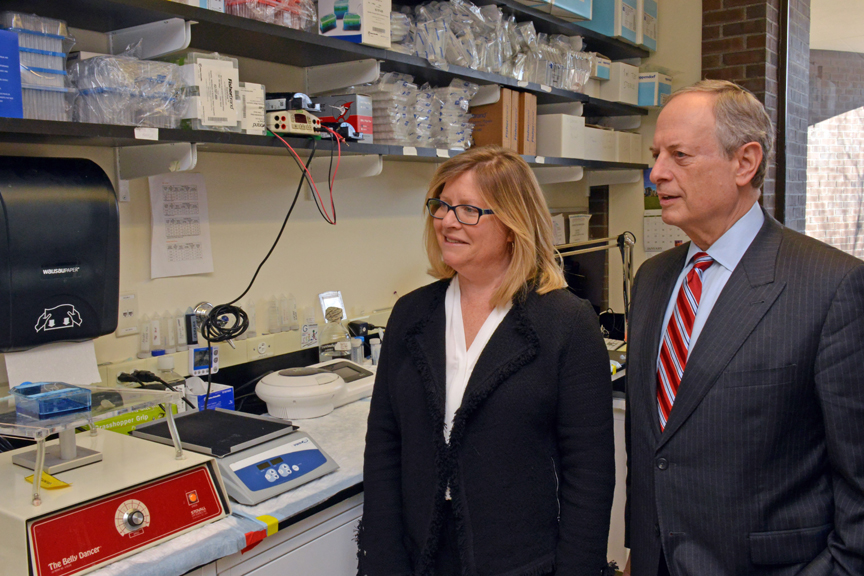New leadership guides international initiative at New York Medical College biotech incubator
In the corner of Deborah Novick’s new office on the New York Medical College campus in Valhalla is a big wooden crate, unopened. She explains it”™s a new microplate reader, a piece of lab equipment designed to test the biological and chemical characteristics of samples in lab experiments.
Novick has a business background, but, as she notes, she is now surrounded by scientists. She took over Jan. 1 as executive director of BioInc@NYMC, the biotech business incubator on the New York Medical College campus.

When scientists and researchers from the startups that call the 6,500-square-foot incubator home come asking for things such as an additional microplate reader, Novick’s job is to deliver. But, more than that, it’s also to help guide the mostly young companies through the business of launching a biotech firm.
“What I like to say is, I”™m going to help them answer the questions they know they have, and find the questions they don”™t even know they should be asking,” Novick said.
A Larchmont resident, Novick started her career at a boutique firm on Wall Street that advises startups and entrepreneurs. She later ran her own real estate staging business before going back to advising new businesses. She has also taught classes for the Women”™s Enterprise Development Center in Yonkers and White Plains.
A month into the job at the biotech incubator, she said she”™s still getting to know the resident companies to better work with them on whatever business needs they have, such as marketing, legal help and accounting. She described the job as a chance to take her experience helping entrepreneurs around the country and apply it locally.
New York Medical College, which is part of the metropolitan region”™s Touro College and University System, launched the BioInc@NYMC incubator in 2014 with a mix of county, state and federal funds. The incubator received $1.25 million from the state last year through its designation as a biotech Innovation Hot Spot.
The incubator is home to eight startups, which use its lab equipment, administrative space and professional services to both research their products and start developing the business end of their companies.
Last year, the incubator booked a prominent anchor tenant when the Dutch technology conglomerate Royal Philips signed on for office space there for 13 researchers in its genomics program.
Novick will help oversee a new international phase for the incubator. Touro and New York Medical College recently launched the TruMada initiative, which will offer space in the incubator and access to its services for Israeli biotech startups. The initiative will target companies that are past the incubation phase, but need a landing space to bring their products or research to the U.S.
“Israeli biotech companies have a problem,” said David Raab, executive vice president of the Touro College and University System. “They”™re really smart on the technology, really smart on the science, but they have a very hard time coming across the ocean ”” understanding the U.S. market, doing clinical tests here, getting FDA approval and figuring out how to market and distribute their product.”
Raab described Israel as “the startup nation” because of the advanced state of its general technology and biotechnology sectors. But in the U.S. market, “These companies can”™t make it here and so they sell out early, they sell out very young, either to a pharmaceutical company or to a medical equipment company,” he said.
Through TruMada, Raab said the incubator would “offer a portfolio of services to clients” trying to expand in the U.S. market. That includes offering space and services in the incubator, along with access to capital.
Touro has created a group of potential investors for the initiative called the TruMada Investor Club and has formed a limited liability company, TruMada Management Co., to facilitate and administer investments. In January, the investor group met for the first of what Raab described as a “Shark Tank” pitching event for three interested Israeli companies. Similar events will be held quarterly as part of the initiative.
The companies in the incubator could utilize either laboratory or office space, similar to BioInc’s current roster of clients.
“Each company is going to have different needs, whether from Israel or the U.S.,” Novick said. “And we”™ll be supporting them and finding the resources that they need regardless. But it will be great to be able to attract those extra scientific breakthroughs to our campus.”
To accommodate that initiative and more American startup tenants, Raab said the medical college will soon look to expand the incubator to about 15,000 square feet of space from its current 6,500 square feet,
BioInc@NYMC is housed in a 120,000-square-foot building at 7 Dana Road. Next door to the incubator in the building is the college”™s 21,000-square-foot Clinical Skills and Disaster Medicine Training Center.
As the incubator grows, one question its administrators must answer is how to officially graduate companies when they’ve passed the stage where a presence in the incubator is necessary, Novick said. While she said there are no companies headed for the door just yet, “We do have to know what is the right moment for a company to graduate.”
Touro and BioInc@NYMC launched the TruMada initiative last fall. Raab said they”™ve since had four companies from Israel tour the site. Raab and Novick will also travel to Israel soon to promote the initiative. The goal is to have at least one company make the overseas transition to BioInc@NYMC space sometime this year.
“This is an idea that”™s kind of been gestating for three years,” Raab said. “We know there”™s the need… and we know we can offer exactly what they want, and now we”™re getting started.”
As for the TruMada initiative”™s name, Raab explained it”™s a combination of two Hebrew words.
“From Hebrew, ”˜truma”™ is a contribution, and ”˜mada”™ is science,” Raab said. A shortened combination of the words makes “a contribution to science.”